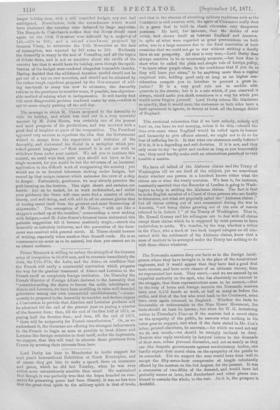The Newcastle masters deny our facts as to the foreign
immi- grants whom they have brought in in the place of the recalcitrant engineers, and it would appear that they have had a good deal more success, and have more chance of an ultimate victory, than we represented last week. They assert,—and we are assured by an impartial authority on the spot, who has absolutely no interest in the struggle, that these repreaentatious seem to be correct,—that by the help of home and foreign recruits the Newcastle masters have now 3,116 bands at work, or half as many as before the strike, and that of the few who went back to the Continent, some have oven again returned to England. Whether the facts be favourable or uufavourable to the Nine Hours' Movement, the facts should at least be known ; but when Sir W. G. Armstrong writes to Thursday's Times as if the masters had a moral claim on the sympathy of the public, he assumes what nothing in his letter goes to support, and what if the facts stated in Mr. Cox's letter, printed elsewhere, be accurate,—for which we need not say we do not vouch,—we should be strongly inclined to deny. Masters who reply cavalierly by lawyers' letters to the demands of their men, refuse personal discussion, and act as nearly as they can like despotic governments against revolutionary bodies, can hardly expect their moral claim on the sympathy of the public to be conceded. Yet we suspect the men would have done well to accept the fifty-seven-hour compromise at length reluctantly offered by the masters on the 3rd August, for the present. It was a concession of two-fifths of the demand, and would have led probably sooner or later, had Sunderland and other places con- tinued to concede the whole, to the rest. As it is, the prospect iis doubtful.






























 Previous page
Previous page